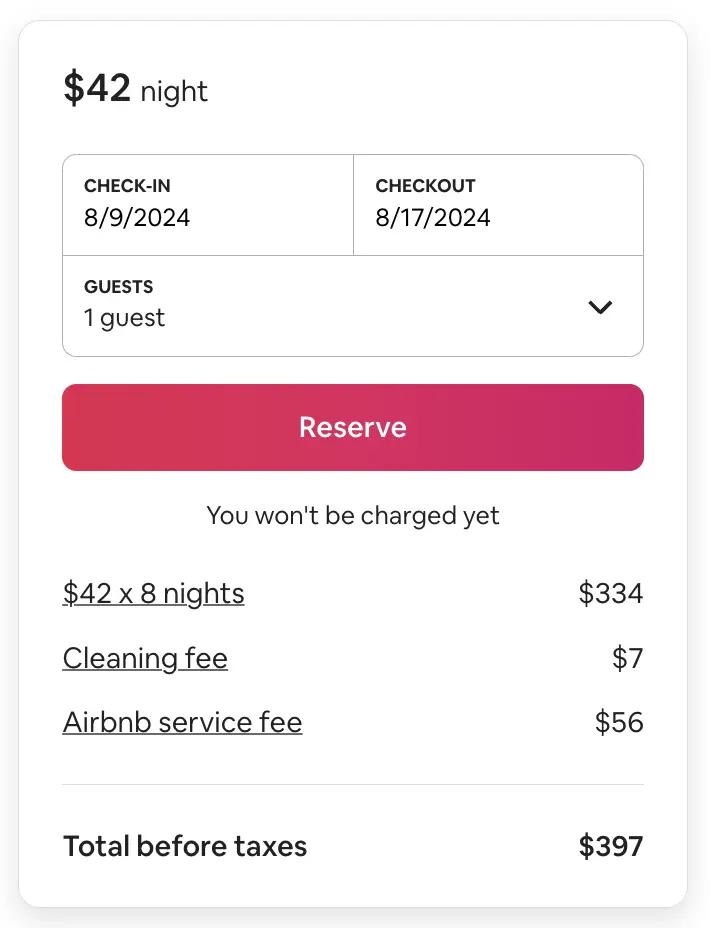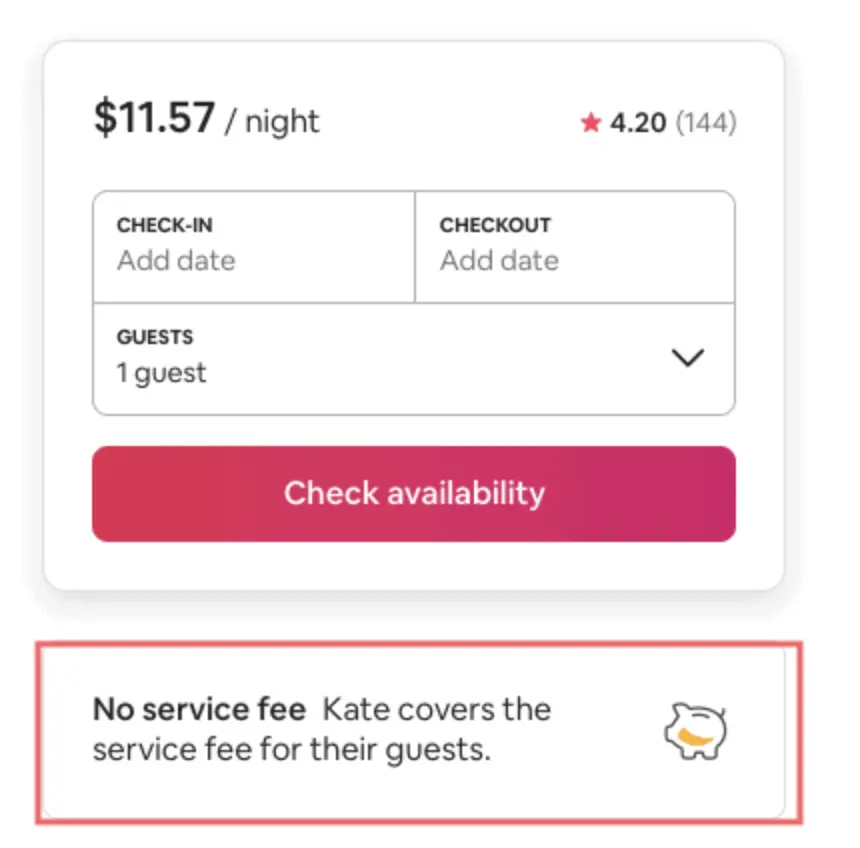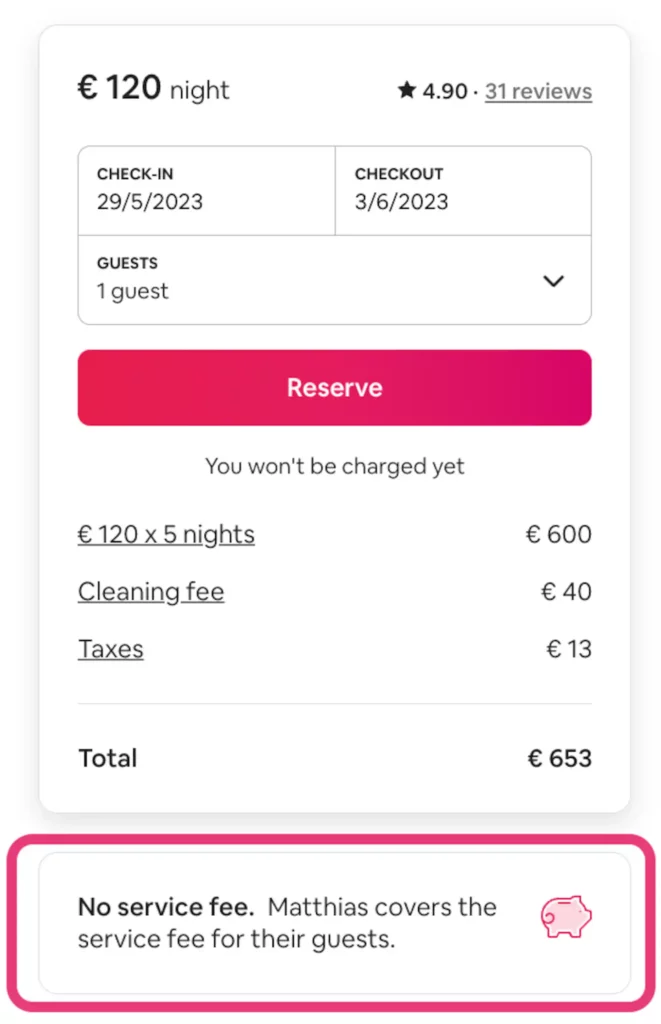Updated: October 22, 2024
For many Airbnb hosting is a way to earn money while connecting with folks from all over the globe. Questions such as how much does Airbnb charge and how does Airbnb service fee affect you are important to be addressed.
When you have a clear understanding of what Airbnb service fees are, you can set a clear and successful pricing strategy.
What is Airbnb Fees?
There are two different fee structures for stays: a split fee and a Host-only fee.
Airbnb charges service fees to cover the cost of services like 24/7 customer support. There are two different fee structures: split fee and a host-only fee.
What is Split-Fee?
The Airbnb split fee is a service fee structure where the total fee for a booking is divided between the host and the guest. This is one of two primary fee structures offered by Airbnb, the other being the host-only fee.


Here’s a Breakdown of the Split Fee Structure
- Host Fee: Typically, hosts pay a fee of around 3% of the booking subtotal, which includes the nightly price and any additional fees set by the host, but excludes guest service fees and taxes. However, this percentage may be higher for hosts with listings in specific regions, such as Italy, or those with strict cancellation policies.
- Guest Fee: Guests are charged a service fee that generally ranges from 13% to 20% of the booking subtotal. This fee varies based on factors like the length of stay and the guest’s location. For stays of 28 nights or longer, the guest service fee may be reduced.
Advantages of the Split Fee
- Attractive Pricing: Hosts can set lower nightly rates since the guest absorbs a significant portion of the service fees, potentially making their listings more appealing to potential guests.
- Transparency: Guests see the service fees during checkout, which helps them understand the total cost of their stay upfront.
What is Host-only Fee?
The host-only fee is a service fee structure used by Airbnb where the entire fee is deducted from the host’s payout, meaning guests do not see any additional service fees at checkout. This fee typically ranges from 14% to 16% of the total reservation amount, although it can be higher for hosts with specific cancellation policies or in certain regions.


What are the Key Features of the Host-Only Fee?
- No Guest Service Fee: Under this structure, guests are not charged a service fee, which can make listings more attractive as the price they see is the final price they pay.
- Control Over Pricing: Hosts have greater control over their nightly rates since they can adjust them to account for the service fee. This allows hosts to maintain competitive pricing without surprising guests with additional fees.
- Mandatory for Certain Hosts: The host-only fee is required for traditional hospitality listings (like hotels and serviced apartments) and for hosts using third-party property management software if they have a majority of their listings outside of certain countries, including the U.S. and Canada.
- Potential for Increased Bookings: Airbnb has reported that listings using the host-only fee structure may see an increase in bookings, as guests prefer transparency in pricing without hidden fees.
The host-only fee structure aims to simplify the booking process for guests while giving hosts more control over their pricing strategies.
What is Simplified Pricing?
Airbnb’s Simplified Pricing is a mandatory service fee structure introduced in December 2020 for most software-connected hosts globally (excluding U.S., Canada, Mexico, Uruguay, Bahamas, Argentina, Taiwan).
The key aspects are:
- Hosts pay a flat 15% service fee, deducted from each payout
- Guests are not charged any service fees
- Hosts have full control over pricing and what guests pay
- Airbnb claims listings with Simplified Pricing see up to 17% more bookings
This replaces the previous “split fee” model where hosts paid around 3% and guests paid 11-12% service fees. The host-only fee structure, where hosts pay 14-16%, remains mandatory for traditional hospitality listings and some other hosts.
Simplified Pricing aims to provide more transparent pricing for guests while allowing hosts to set competitive nightly rates. However, it requires hosts to adjust their pricing strategies to offset the higher 15% host fee and remain profitable.


What is the Difference Between Host-only Fees and Simplified Pricing?
| Host-Only Fees | Simplified Pricing |
| Hosts pay a service fee typically ranging from 14-16% of the total booking amount. | Mandatory for most software-connected hosts globally (excluding U.S., Canada, Mexico, Uruguay, Bahamas, Argentina, Taiwan) since December 2020. |
| Guests do not see any additional service fees at checkout. | Hosts pay a flat 15% service fee, deducted from each payout. Guests are not charged any service fees. |
| Mandatory for traditional hospitality listings (hotels, serviced apartments, etc.) and hosts using third-party software if the majority of listings are outside certain countries. | Hosts have full control over pricing and what guests pay |
What Strategies to Use to Avoid Airbnb Fees as a Host?
As an Airbnb host, there are several strategies you can employ to minimize the impact of service fees on your profits:
List Your Property on Other Platforms
One effective approach is to list your property on alternative vacation rental platforms that charge lower service fees than Airbnb. This allows you to reach a broader audience while retaining more of your earnings.
Create Your Own Website
Encourage guests to book directly through your own website, where you can avoid Airbnb’s service fees altogether. A simple, professional website is sufficient to facilitate direct bookings.
Offer Discounts for Direct Bookings
Consider offering discounts to guests who book directly through your website or other channels. This can help offset the cost of Airbnb’s service fees and incentivize guests to book outside the platform.
Provide Exceptional Service
Focus on delivering an exceptional guest experience to encourage repeat bookings and referrals. Satisfied guests are more likely to book directly with you in the future, helping you minimize reliance on Airbnb.
Offer Value-Added Services
Consider providing additional services or amenities that justify your pricing. This can enhance the overall guest experience and potentially make them more accepting of the associated fees.
Cancellation Policy
Your chosen cancellation policy plays a role in determining the host service fee. A strict cancellation policy may lead to a service fee approximately two percent higher than more flexible policies. The rationale behind this is that a strict policy demands more administrative support, prompting Airbnb to charge a premium.
Adjust Your Pricing Strategy
Carefully analyze your costs and the market to set competitive nightly rates that account for Airbnb’s service fees. This may involve raising your rates to maintain your desired profit margins.
Incorporate Fees into Pricing
Factor Airbnb service fees into your listed rates. Calculate the desired net amount you want to earn each night, considering the service fee, and set your prices accordingly.
Frequently Asked Questions
Are Service Fees Refunded if a Reservation is Cancelled?
The Airbnb service fee is refunded to the guest if the guest cancells the reservation before the free cancellation period ends or if you decide to refund the guest in full even after the free cancellation period.
Are Airbnb Service Fees Tax-Deductible?
As an Airbnb host and incur service fees for renting out your property, these fees are typically considered a deductible business expense. As part of your rental income and expenses, you can deduct Airbnb service fees on Schedule E of your tax return. It is important to maintain proper documentation and to consult an accountant for accurate information on deductibles.
Conclusion
You must strategically navigate Airbnb fees by adjusting your pricing, exploring alternative platforms, and enhancing your listings to attract more guests. By implementing effective pricing strategies and focusing on direct bookings, you can mitigate the impact of service fees and improve your overall profitability on the platform. Understanding these dynamics will enable you to make informed decisions that align with your business goals and enhance your hosting experience.








